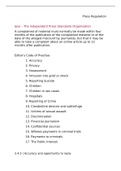Press Regulation
Ipso – The Independent Press Standards Organisation
A complained of material must normally be made within four
months of the publication of the complained material or of the
date of the alleged miscount by journalists, but that it may be
able to take a complaint about an online article up to 12
months after publication.
Editor’s Code of Practise:
1. Accuracy
2. Privacy
3. Harassment
4. Intrusion into grief or shock
5. Reporting Suicide
6. Children
7. Children in sex cases
8. Hospitals
9. Reporting of Crime
10. Clandestine devices and subterfuge
11. Victims of sexual assault
12. Discrimination
13. Financial journalism
14. Confidential sources
15. Witness payments in criminal trials
16. Payments to criminals
17. The Public Interest
2.4.2 | Accuracy and opportunity to reply
, “There is no public interest in accuracy.”
- The Press must take care not to publish inaccurate,
misleading, or distorted information or images, including
headlines not supported by the text.
- A significant inaccuracy, misleading statement or distortion
must be corrected, promptly and with due prominence, and
— where appropriate — an apology published. In cases
involving IPSO, due prominence should be as required by the
regulator.
- A fair opportunity to reply to significant inaccuracies should
be given, when reasonably called for.
- The Press, while free to editorialise and campaign, must
distinguish clearly between comment, conjecture, and fact.
- A publication must report fairly and accurately the outcome
of an action for defamation to which it has been a party,
unless an agreed settlement states otherwise, or an agreed
statement is published.
2.4.2.1 | Corrections and apologies
- “A significant inaccuracy, misleading statement or distortion”
must be corrected “promptly and with due prominence’, and,
where appropriate, with a published apology, and that in
cases involving Ipso due prominence should be as stipulates.
- Ipso has no power to compel publication of apologies. But a
failure to offer one when appropriate can lead to a complaint
being upheld.
- Ipso has said that an apology is “required” when an error has
been “personal to” and has the potential to be “seriously
damaging to” the complaint.





